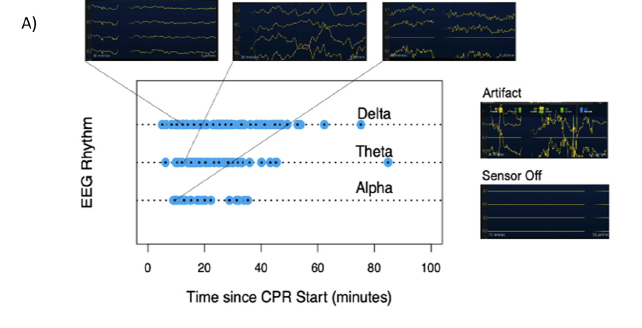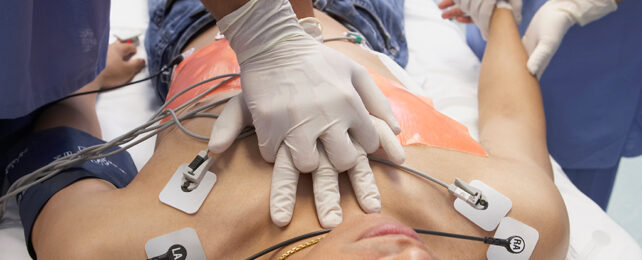Long after our heart has fallen into a quivering silence, our brain can continue to murmur quietly to itself.
A follow-up to a major study into the mysterious experiences of death has identified potential flickers of awareness in the minds of cardiac arrest patients as medical staff attempt to resuscitate them.
Led by researchers from New York University Grossman School of Medicine, a team of critical care providers and medical specialists tested the recall and experiences of patients admitted to hospitals in the US and UK who underwent cardiopulmonary resuscitation (CPR).
A pilot substudy collected electroencephalogram (EEG) activity and cerebral oxygen levels during CPR, giving the researchers a glimpse of the fading light of dozens of dying brains.
Among the 567 patients selected for the study, 213 regained a pulse. Of those, a mere 53 survived to be discharged, with just 28 healthy enough to participate in follow-up interviews.
The numbers themselves show just how brutal cardiac arrest can be for a body. The moment the heart forgets how to keep its steady rhythm, blood pressure plummets, allowing carbon dioxide and other waste products to build to toxic levels while withholding precious oxygen from energy-hungry tissues.
As a result, cells fail one by one, with ravenous brain circuits among the first to falter.
While CPR can provide enough circulation to give our systems a fighting chance of finding their rhythm again, chest compressions are a poor substitute for the heart's pumping action, with chances of recovery dropping steadily as the minutes slide by.
Exactly what this means for neurological functions has never been entirely clear. Between lab studies on rats and field studies on dying patients, it's clear the brain can – at least occasionally – take a surprisingly long time to sputter into complete silence after adequate circulation has ceased.
But how to interpret spikes of activity in light of anecdotes reporting a litany of emotional, sensory, and cognitive experiences while in a dying state is a topic of ongoing study.
Pulmonologist Sam Parnia has spent years investigating the process of dying, not just from a neurological perspective but also from a psychological one. Lead author of the AWAreness during Resuscitation (AWARE) study, published in 2014, this latest study attempts to build on previous findings with a larger sample and a modified method.
As a part of the AWARE II project, Parnia and his team used an app, tablet, and headphones with 365 patients undergoing CPR in search of signs that, in spite of being unresponsive, there might still be some degree of awareness.
Of the 28 interviewed, none recalled the images presented on the tablet or reported hearing the sounds on the headphones. Nonetheless, this wasn't to say their brains weren't humming with some sort of activity, with the few healthy survivors reporting recollections of their resuscitations such as chest compressions, sensing electrodes on their skin, and hearing voices from surrounding clinicians.
Real-time brain monitoring backed up the possibility that in spite of impaired cardiac activity, there was a chance neurological activity could be sustained, with 40 percent of survivors regaining relatively normal or near-normal EEG recordings up to an hour into CPR.

The data in the recordings reflected the kind neurologists would associate with higher mental functions.
"Although doctors have long thought that the brain suffers permanent damage about 10 minutes after the heart stops supplying it with oxygen, our work found that the brain can show signs of electrical recovery long into ongoing CPR," says Parnia.
"This is the first large study to show that these recollections and brain wave changes may be signs of universal, shared elements of so called near-death experiences."
Though far from definitive, having hints that the brain is still processing environmental cues, memories, and emotions during CPR could tell us more about how our nervous system prioritizes cognitive functions, or deals with the risk of total shutdown.
This research was published in Resuscitation.
